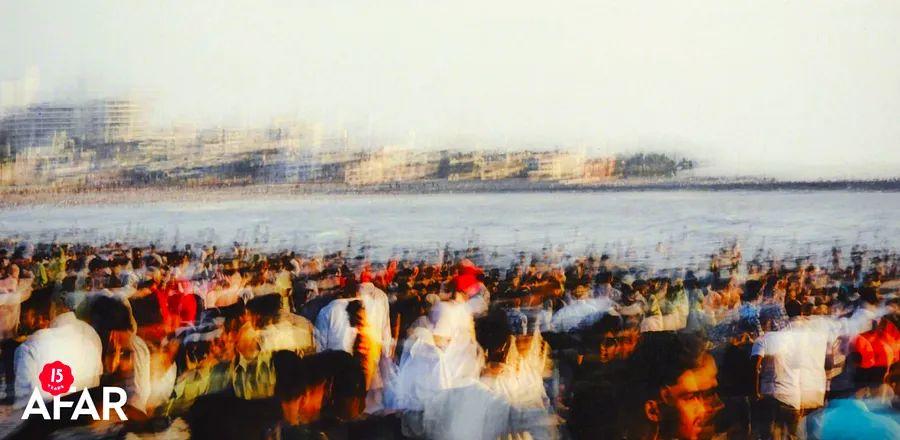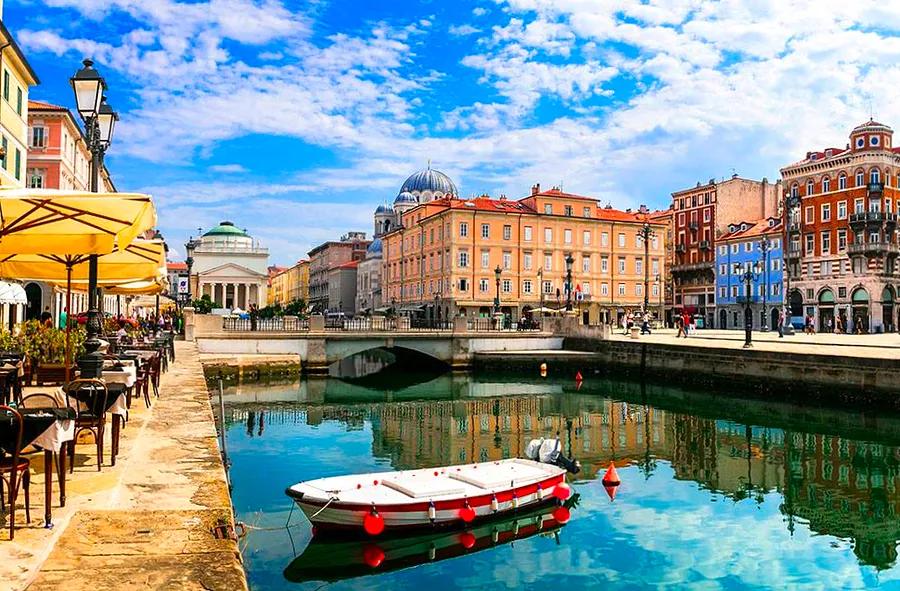Revisiting Mumbai After a Transformative Loss

This article is part of Dinogo, A Retrospective. In celebration of Dinogo’s 15th anniversary, our editors and cofounders have chosen this story as one of their 15 favorites. We hope you enjoy it as much as we do.
It’s November in Mumbai, which means: it’s hot.
I find myself in a familiar spot, having stood here countless times throughout my life—as a toddler learning to walk, a bespectacled child with scraped knees, an awkward teenager adjusting a skirt that drew too much attention, a young woman adventuring after college, and a newlywed visiting with my husband.
This time, I’m here as a writer, a wife, a mother. I’m just around the corner from a bustling park filled with morning walkers, in the lush suburb of Vile Parle, on the street where my grandparents, followed by my aunt, lived in a building named Nav Samaj. I can recall every detail: the mineral scent of the staircase, the daybed where I spent countless hours devouring Reader’s Digest magazines, the cool tile floor where I’d lie down to escape the heat, and the dark kitchen where some of my life’s most memorable meals were prepared. The almirah in the bedroom held my grandmother’s starched, mothball-scented saris.

Photos by Avani Rai
However, the scene has transformed; Nav Samaj is no longer there. In its place, a new building named Navasamaj—its name emblazoned in large gold letters on the facade—rises, designed to be three times the size of the original. I point it out to my four-year-old daughter, Kavi, attempting to convey the disconnect in my perception. She’s never been to India before; she’s too young to witness this haunting absence.
No city holds more beauty and personal significance for me than this one—where my parents grew up, fell in love, and eventually left for America in their twenties. Yet, there is also no place where I feel more out of my depth. As a child, I would visit for weeks but rarely experienced Mumbai. Passed around like a parcel among relatives, I never handled money, ventured out alone, and spent most of my time confined to family rooms. However, my mother’s sister-in-law (my Mami, as we call her in Gujarati) opened up her Mumbai to me. Ila Mami grasped something about her city, and perhaps about me as well.

Photos by Avani Rai
During one visit as a teenager, we purchased a pirated Hindi music CD from a street vendor. Back in the now-nonexistent apartment, Ila Mami jumped up to dance, encouraging me until I joined her. On another occasion, while outside the market, she paused at a guava cart—would you like one? Yes, I always did—she cleaned the fruit with her handkerchief before handing it to me. She was there haggling for pants for me; there she was treating me to kulfi, the frozen dessert expertly sliced from a cart. We found ourselves in the midst of a rainstorm, soaking wet and laughing, reveling in the kind of rain that appears and disappears in an instant. It was more than just sharing joy with Ila Mami; she illuminated the city for me. Now, in 2023, my spirited, life-loving aunt has passed, taken too soon. Most of my other relatives have relocated, and some have left India altogether.
Every city contains its own universe, and none more so than Mumbai. There are countless routes through the city, each unique to its inhabitants, yet my navigators are no longer here. Seven years after my last visit, I am back in Mumbai with my white husband and our mixed-race daughter, seeking to experience the current city. Yes, we will always feel like outsiders here. But will there be a moment, a meal, or an interaction that makes Mumbai understandable for us? Can I uncover it as my aunt once did for me?

Photos by Avani Rai
The following day, we hop into a rickshaw bound for Juhu Beach, the longest and most popular sandy stretch in Mumbai. The ride weaves through mostly quiet streets before plunging into chaotic traffic—until we finally arrive at the sea. Along the beach, we admire the weathered facades of the once-stunning Bombay-deco homes lining the coast, their vibrant hues now dulled, many windows boarded up. I still find them enchanting. I recall ponies, and even elephants, available for rides, vendors selling marbled balloons on sticks, and bhel puri sellers handing over cones filled with crispy puffed rice. However, I also grew up visiting Girgaon Chowpatty Beach in southern Mumbai, and these memories are so blurred with time that I can't tell which beach they belong to. Today, Juhu Beach is bustling with aunties in running shoes, families enjoying picnics, and boys and men of all ages playing cricket. The shoreline curves, vanishing into the haze and sea mist heading north towards Versova, where fishermen are out in boats adorned with painted eyes.
We stroll to one end of the beach and then turn back, feeling hot and a bit peckish. We purchase a coconut for my daughter but can't convey to the vendor that we want him to crack it open to scoop out the cream—a miscommunication my husband and I would have laughed off or shrugged at, but which leads my daughter to burst into tears. Now, we're kneeling in the sand, practicing our American parenting with I hear you and you seem very frustrated, as bemused vendors and onlookers watch us, clearly unaccustomed to such a tantrum or such ineffective parents. "You promised," she cries, and we had. Defeated, we pick her up to head home. However, in the rickshaw, the driver misinterprets my American-accented directions, taking us in the opposite direction from Vile Parle, transforming a 15-minute journey into one that takes four times as long, while he alternates between questioning us in exasperated Hindi and shaking his head at our cluelessness. Hearing my own voice, despite my attempts to soften its long, bland vowels and lazy consonants, makes me blush, as I struggle to pronounce bottle instead of baddle, and sorry instead of sawry. Back in the flat, we feel humbled and exhausted, surrendering to jet lag much too early.

Photo by Avani Rai
That night, I lie awake in bed, my body buzzing with frustration. The fact that I can't make myself understood in Mumbai, as I did with the rickshaw driver earlier, reveals the city's closed-off nature. I come to realize that no place highlights my failures quite like this one. It’s a painful recognition intertwined with my privilege as an American, whose appearance suggests familiarity, yet whose voice and demeanor mark her as an outsider. How will I navigate through this?
Sanjay Gandhi National Park sits like a jewel amid the sprawling cityscape. For me, it represents a fresh start, untainted by memory or expectations. Despite numerous visits to Mumbai, I’ve never explored this park, which was established just before my parents departed from India. It’s a place that shares its age with me. On our third day in Mumbai, we take the train—alight at the wrong station, hop back on—and then hire a rickshaw, whose quoted fare seems ridiculous once we realize it’s an easy walk.

Photo by Avani Rai
The park spans nearly 40 square miles, where numerous playgrounds and cricket fields gradually give way to wilder landscapes deeper within. As a family of three, we meander through the spacious, shaded areas, marveling at the fantastical spotted butterflies and others the size of our palms, their wings a dazzling, iridescent blue. We discover a playground where my daughter climbs a tree, impressing an older boy who follows her. A little girl approaches Kavi, trying to make a friend: My daughter, shyly, raises her hands to her chest and begins to hop like a bunny. The girl mimics her. When we chat with her parents, it feels quite like the playground conversations we have at home—as if, for a moment, we are seen as our true selves.
By the park’s boating area, vendors sweep away dust and lay out cloths to sell their goods: sliced unripe star fruit sprinkled with a salty-sweet spice, fresh sugarcane juice, and zesty lime soda. We purchase coconut water for my daughter and watch as her flushed face relaxes while she drinks. Without being asked, the coconut vendor cracks open the fruit for the cream, handing her a piece of the shell to use as a scoop. Here’s a pleasure, reminiscent of what Ila Mami might have offered me, that I can finally share with my daughter: a small triumph to counterbalance the little failures, miscommunications, and tantrums.

Photo by Avani Rai
Kavi has fair skin and copper hair, yet here in the park, she wears her Sanskrit name with pride. Her face is smudged with dirt, her shoes dusted with red earth, and her curious eyes take in the flitting butterflies, wind-touched trees, overly friendly monkeys, and the joyful flow of faces around her. My own memories of early visits to India are scarce. What impressions will she carry with her?
Moment by moment, this city will teach me to remain present, to notice, to weave connections, and to find joy wherever it appears.
We’re exhausted—contentedly so—on the train ride back home. My daughter curls up in my lap and drifts off as we journey through the transforming city, where sleek towers of luxury residences rise in suburban areas and forests are cleared for new highways. A different sensation unfurls within me—not one of confidence or control, but of playfulness. An openness to the unfamiliar. Mumbai is a city that thrives on adaptability, something I believe my aunt understood well.

Photo by Avani Rai
In the coming days, we’ll savor little clay cups of chai infused with cardamom and bowls of sabudana khichdi, perfectly spiced to the edge of delight, where the soft, chewy tapioca meets the crunch of peanuts and the zing of lime. Mornings will greet us with honeyed, cool air, and Mumbai will feel like the most enchanting city, lush and gentle, brimming with guava, custard apple, and dragon fruit, which I’ll bring home for my daughter’s first taste. I’ll attend a handicraft fair reminiscent of one I last visited with Ila Mami, watching Umar, the vendor, delicately display radiant scarf after scarf, reminding me of the pure joy of shopping in India. My husband will devour a lifafa wrap from Swati Snacks, both of us nearly shouting with delight at the exquisite blend of mint and richness, the lingering heat of chili—a true feast for the senses. A vibrant brass band will entice us to pause and listen as it marches by, the festival it celebrates a mystery, yet we’ll find our spirits uplifted by its rhythmic joy. I’ll see my daughter giggle as she slides down the tallest slide at the school next to our flat in Vile Parle. I’ll glance at my husband, who embraces his feeling of being out of place with good humor, sporting the wedding ring we chose together with Ila Mami. Moment by moment, this city will teach me to remain present, to cherish connections, and to seek joy wherever it appears. Though I can’t replicate Ila Mami’s Mumbai for my family or myself, her memory guides us in discovering our own version of this vibrant city.

1

2

3

4

5
Evaluation :
5/5